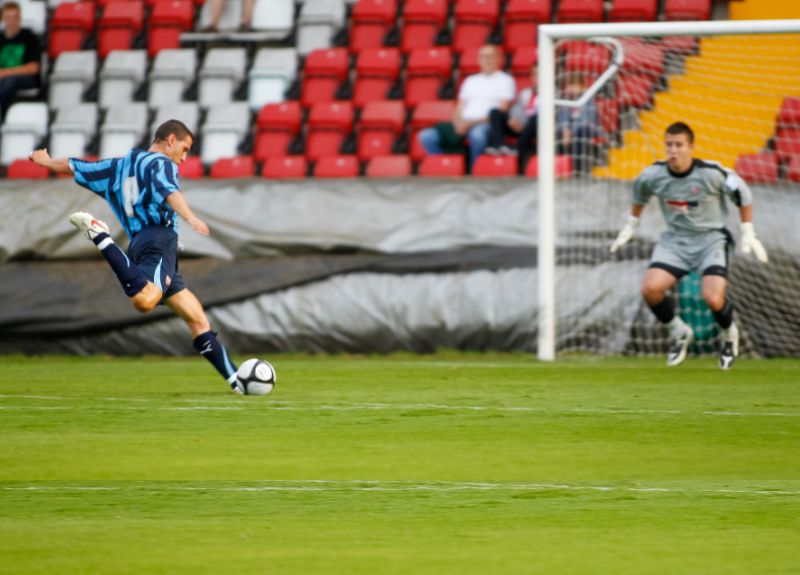Get in touch
Thanks for getting in touch

The Fine Line Between Hunger and Greed
Ollie Watkins said it straight:
“I played 20 minutes against PSG in both games. I am not going to lie, I was fuming that I wasn’t playing – I let him [Unai Emery] know that… I’m banging on the door asking why I’m not playing.”
I love reading that
That’s hunger. That’s a refusal to accept. And for me, that’s exactly what it takes to achieve high-level goals.
As a goal-setting coach, I talk a lot about desire, about the edge that separates high achievers from the rest.
Some people call it greed. And maybe they’re right.
There is a fine line between hunger and greed, but the truth is that to get where you want to go, to perform at the top, you need to have both.
So much, so I recently wrote down the top five things that I thought a player needed to make it in the professional game, greed was number three on that list.
Call it what you like, desire, ambition, drive, it is all the same.
Watkins could’ve accepted his place on the bench.
He didn’t. He challenged it, head-on. Respectfully, directly. Not through whispers, not through agents. He walked down the corridor and knocked on the manager’s door. That matters.
Too often during my career I saw players unhappy after a training session calling their agents to get them to call the manager when his office was literally 10 metres away. Involving a middleman who no doubt would relay a different story to both sides.
For me, it was weak, passing the buck to someone else.
I remember a moment from my own career that still lives with me.
First game of the season, playing for Reading away at Blackpool. I’d been frustrated for most of the match. Not much had come off. But then, late in the game, I picked the ball up on the right, drove past a defender, and cut in at a tight angle towards goal.
My teammate, Martin Butler was in the perfect spot. I could’ve squared it. He’d have tapped it in. Job done.
But I didn’t.
I shot.
And in that split-second, I remember thinking to myself, “You’d better f***ing score here son, or you’re in trouble.”
The ball bounced off the far post and went in. Goal. And off I went, celebrating like it was a cup final.
Was I right to shoot? Was I wrong?
Was it hunger?
Was it greed?
It worked out. But the question still lingers.
That moment sits right on the edge of everything this article and Watkins comment is about.
I was fortunate to start more games than I sat out during my career. But I saw it all. Some players accepted being on the bench far too easily, laughing, chatting, coasting.
Show me a player content to sit still, and I’ll show you someone on their way out of the game.
There’s a phrase I love from Drewe Broughton, performance coach and former pro:
“Healthy disrespect”
It’s the idea of refusing to accept a situation that doesn’t reflect your potential. It’s not about arrogance or ego.
It’s about self-worth.
And it’s critical.
Even my 14-year-old son Fred is learning this.
He was frustrated recently because he was only getting 50% of the game time. League rules meant game time had to be split, but in midfield, where there’s more competition, that hit harder. He sat on the sides where others in different positions were getting full games.
So I challenged him: “What are you going to do about it?”
He said he didn’t know. So I said: “Why don’t you speak to your manager?”
And he did. Politely. Respectfully. But clearly.
“I’m not happy, I want to play more”
Since then? More minutes. More involvement. Because he took action. He showed hunger. He showed healthy disrespect.
When I coach elite athletes, I hear this mindset echoed in different ways. One swimmer I work with talks about giving “no favours” That means no one gets a leg up on you. Not mentally, not physically, not in preparation. It’s a mindset of no free passes.
High standards.
Ruthlessness.
We shouldn’t demonise ambition.
We shouldn’t confuse hunger with ego.
The real danger is the opposite.
Unhealthy respect.

That’s where people shrink. That’s where talent withers away. That’s where mental health issues often start, when people keep the peace at the cost of their potential.
So, if you’re fuming you’re not starting – good.
If you’re banging on the manager’s door – great.
If you’re shooting when you could pass – own it.
Sometimes we have to risk being seen as greedy to prove we’re hungry enough.
And when you hit the far post and the ball goes in?
You’ll know you made the right call.
Or will you?
Was I right or wrong?
You tell me.
Be the best version of you
Your journey to a brighter future starts here
Book a Discovery Call with Nicky